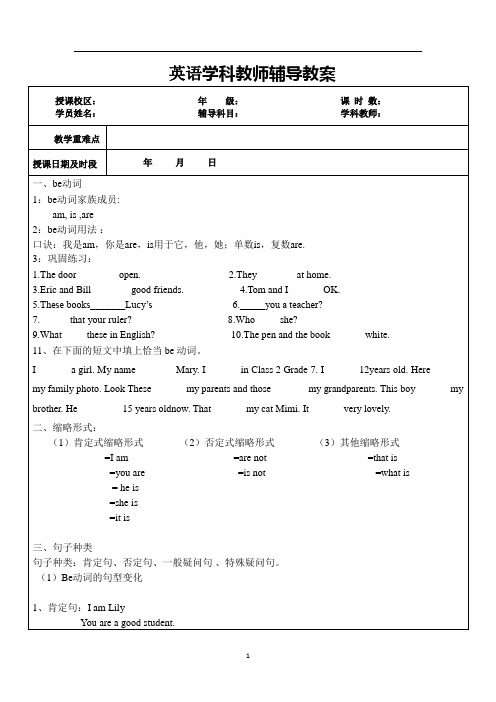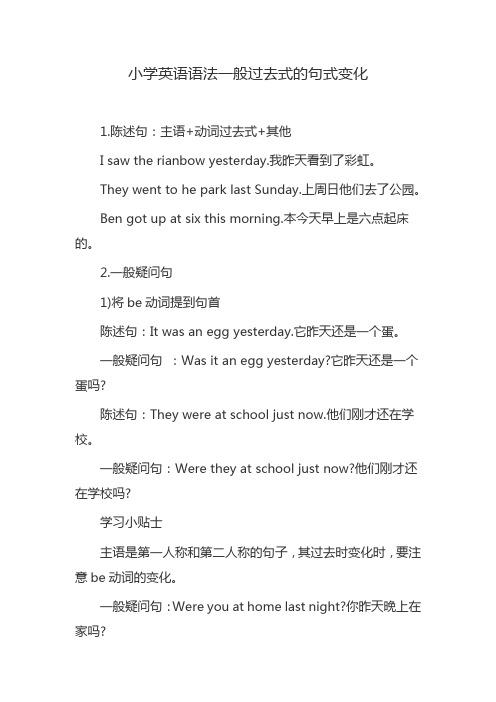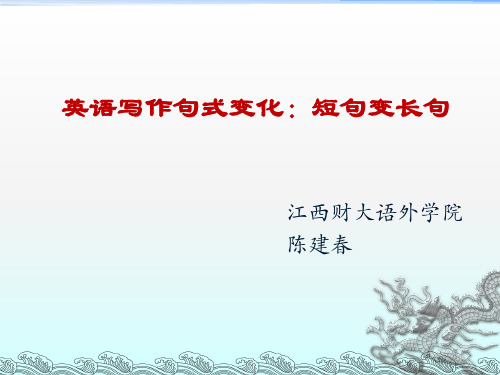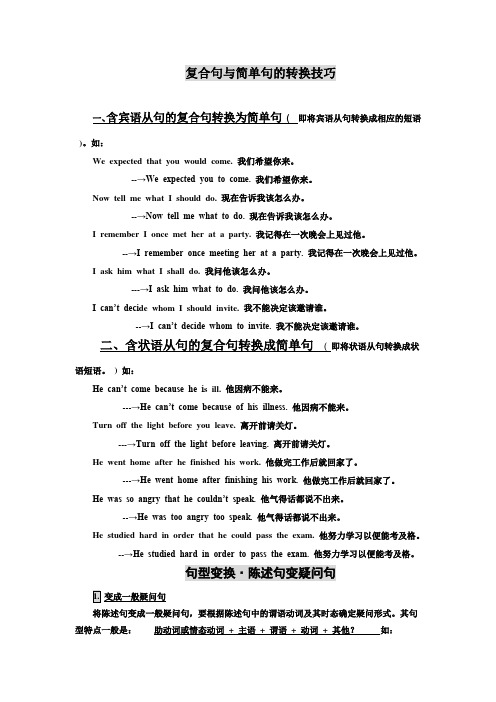英语句式变化
英语中的4种句式变化(肯定句、否定句、一般疑问句,特殊疑问句的相互转化)

5. Is this your pen? (肯定回答)
________________________
6. Is that her English book? (否定回答)
________________________
三、根据括号内的要求,改写下列的句子。
_________=she is
_________=it is
三、句子种类
句子种类:肯定句、否定句、一般疑问句 、特殊疑问句。
(1)Be动词的句型变化
1、肯定句:I amLily
You are a good student.It is Nhomakorabea pen.
2、否定句:I am notLily.
You are not a good student.
It is not a pen.
重点:肯定句变否定句:be动词(am,is,are)后面直接加not.
3、一般疑问句:(1)Are youLily?
Yes , I am./ No,I am not.
(2)Are you a good student?
Yes ,I am./ No, I am not.
二、缩略形式:
(1)肯定式缩略形式 (2)否定式缩略形式 (3)其他缩略形式
________=I am _________=are not _________=that is
_________=you are _________=is not __________=what is
_________ = he is
英语学科教师辅导教案
授课校区:年 级:课 时 数:
学员姓名:辅导科目:学科教师:
英语句子转换类型及方法

英语句子转换类型及方法
一、英语句子转换的类型
英语句子转换可以分为两种类型:句型转换和句式转换。
1. 句型转换
句型转换是指将一个句子的结构转换为另一种结构,但语义不发生变化。
句型转换可以分为以下几种:
(1) 主语和谓语的转换
例如:She reads books. -> Books are read by her.
(2) 宾语和谓语的转换
例如:He gives me a book. -> A book is given to me by him.
(3) 形容词和动词的转换
例如:The book is interesting. -> The book interests me.
2. 句式转换
句式转换是指将一个句子的结构和语义都转换为另一种结构和
语义。
句式转换可以分为以下几种:
(1) 肯定句和否定句的转换
例如:He likes apples. -> He doesn"t like apples.
(2) 疑问句和陈述句的转换
例如:Does he like apples? -> He likes apples.
(3) 陈述句和感叹句的转换
例如:He likes apples. -> How does he like apples?
二、英语句子转换的方法
英语句子转换的方法可以分为两种:语法转换和语义转换。
1. 语法转换
语法转换是指通过改变句子的语法结构来实现句子的转换。
六年级英语句式转换30道

六年级英语句式转换30道1. She is a student. (改为一般疑问句)答案:Is she a student? 解析:陈述句变一般疑问句,将be 动词is 提到句首,其余不变。
2. They are playing football. (改为一般疑问句)答案:Are they playing football? 解析:陈述句变一般疑问句,将be 动词are 提到句首,其余不变。
3. I am happy. (改为一般疑问句)答案:Are you happy? 解析:陈述句变一般疑问句,第一人称I 要变为第二人称you,be 动词am 变为are 提到句首。
4. This is a book. (改为一般疑问句)答案:Is this a book? 解析:陈述句变一般疑问句,将be 动词is 提到句首,其余不变。
5. Those are apples. (改为一般疑问句)答案:Are those apples? 解析:陈述句变一般疑问句,将be 动词are 提到句首,其余不变。
6. He likes music. (改为一般疑问句)答案:Does he like music? 解析:陈述句中没有be 动词,主语是第三人称单数he,借助助动词does 构成一般疑问句,likes 变回原形like。
7. We have lunch at school. (改为一般疑问句)答案:Do you have lunch at school? 解析:陈述句中没有be 动词,主语是we,变为一般疑问句时要变为you,借助助动词do 构成一般疑问句,have 形式不变。
8. They do their homework in the evening. (改为一般疑问句)答案:Do they do their homework in the evening? 解析:陈述句中没有be 动词,主语是they,借助助动词do 构成一般疑问句,do 的形式不变。
高中英语写作句式升级变形

写作句式升级变形一、变成被动句1. 被动句在英语中使用广泛,在陈述一个客观事实时,相对于主动句,使用被动句更能够增强文章的说服力。
(建议信)I suggest that you should learn and sing Chinese songs.→ 升级表达:It is suggested that you should learn and sing Chinese songs.二、变成倒装句倒装句是一种使句子呈现亮点的方法。
在写作中常见的倒装句有以下几种:1. 以否定词开头的部分倒装。
以never, neither, nor, seldom, rarely, by no means, hardly, scarcely, no sooner, no longer, in no way, in no case, at no time, Not only... but also, No sooner... than, Hardly ... when 等否定或半否定词开头的句子。
(祝贺信表达高兴)I could hardly hold back my excitement when I heard the news that you were admitted to your ideal university.→ 升级表达:Hardly could I hold back my excitement when I heard the news that you were admitted to your ideal university.(感谢信)I will never forget your kindness and generosity.→ 升级表达:Never will I forget your kindness and generosity.(申请信)I not only have a good command of written English, but also I can speak English fairly well.→ 升级表达:Not only do I have a good command of written English, but also I can speak English fairly well.2. 以“ Only+ 状语” 开头的部分倒装。
小学六年级英语语法 四大时态句式转换

四大时态复习1.一般现在时(1)一般现在时的构成(肯定句)☆be动词:主语+be(am,is,are)+其它。
如:Iamaboy.我是一个男孩。
☆行为动词:主语+行为动词(+其它)。
如:WestudyEnglish.我们学习英语。
☆当主语为第三人称单数(he,she,it)时,要在动词后加"-s"或"-es"。
如:MarylikesChinese. 玛丽喜欢汉语。
(2)一般现在时的变化☆.be动词的变化。
[否定句]:主语+be+not+其它。
如:Heisnotaworker.他不是工人。
((3*动词加ing的变化规则1.一般情况下,直接加ing,如:cook-cooking2.以不发音的e结尾,去e加ing,如:make-making,taste-tasting 3.如果末尾是一个元音字母和一个辅音字母,双写末尾的辅音字母,再加ing,如:run-running,stop-stopping3.一般将来时(1)一般将来时基本结构:①begoingto+do(动词原形);②will+do(动词原形). (2)[否定句]:在be动词(am,is,are)后加not或情态动词will后加not成won’t。
结构为:be(am,is,are)+not+动词原形willnot+动词原形(willnot=won’t)例如:①I’mgoingtohaveapicnicthisafternoon.→I’mnotgoingtohaveapicnicthisafternoon.②Iwillgoshoppingthisweekend.→Iwillnotgoshoppingthisweekend.=Iwon’tgoshoppingthisweekend.(3)[一般疑问句]:be或will提到句首,some改为any,and改为or,第一二人称互换。
例如:①Wearegoingtogoonanoutingthisweekend.→Areyougoingtogoonanoutingthisweekend?②Iwillplayfootballtomorrowafternoon.→Willyouplayfootballtomorrowafternoon?(4)[特殊疑问句]①问人用Who例如:I’mgoingtoNewYorksoon.→Who’sgoingtoNewYorksoon.②问干什么用What…do.例如:Myfatherisgoingtowatcharacewithmethisafternoon.→例如:She’4.(1).[肯定句]be动词在一般过去时中的变化:☆am和is☆are行为动词在一般过去时的句子中要变成过去式(一般是在句子后面加(2)[否定句]:be动词变成如:Hewasn’didn’t+did,句子中的动词过去式变回原形。
英语动词变化规则

英语动词变化规则
1、单三形式(一般现在时)
四变(四种变化形式)
①直接加s
②结尾是o, s, x, ch, sh的加es
③以y结尾的单词,y前是原因直接加s;y前是辅音变y 为i加es
④have变has
2、现在分词(进行时)
四变(四种变化形式)
①直接加ing
②重读闭音节且只有一个辅音字母的单词,双写末字母加ing
③去掉结尾不发音的e,加ing
④变ie为y加ing
3、过去式(一般过去时)和过去分词(完成时和被动语态)变化规律基本相似,放在一起学习。
规则变化
四变
①一般情况下,直接加ed
work—— worked
look——looked
walk——walked
②以e结尾的单词,直接加d
live ——lived
hope——hoped
use——used
③以y结尾的单词
以辅音字母+y结尾的,变y为i加ed
study——studied
carry——carried
以元音字母+y结尾的,直接加ed
enjoy ——enjoyed
play——played
④以重读、一个辅音字母结尾的闭音节结尾的动词,双写最后的辅音字母+ed
stop—— stopped
plan——planned
prefer——preferred。
五年级英语句式转换20道

五年级英语句式转换20道1. 陈述句:I am a student. 一般疑问句:Are you a student? 解析:陈述句变一般疑问句,第一人称I 要变为第二人称you,am 变为are。
2. 陈述句:He likes apples. 一般疑问句:Does he like apples? 解析:陈述句主语是第三人称单数,且动词是likes,变一般疑问句时要借助does,likes 变回原形like。
3. 陈述句:They are happy. 一般疑问句:Are they happy? 解析:be 动词直接提前。
4. 陈述句:She has a pen. 一般疑问句:Does she have a pen? 解析:has 是have 的第三人称单数形式,变一般疑问句要借助does,has 变回have。
5. 陈述句:We play football. 一般疑问句:Do you play football? 解析:陈述句主语是we,变一般疑问句要变为you,借助do。
6. He likes apples. (改为否定句)答案:He doesn't like apples.解析:主语是第三人称单数,否定句要用doesn't,后面动词用原形。
7. They are happy. (改为否定句)答案:They aren't happy.解析:are 的否定形式是aren't 。
8. I have a pen. (改为否定句)答案:I don't have a pen.解析:主语是第一人称,否定句用don't 。
9. She can sing. (改为否定句)答案:She can't sing.解析:can 的否定形式是can't 。
10. We play football on Sundays. (改为否定句)答案:We don't play football on Sundays.解析:主语是复数,否定句用don't 。
小学英语语法一般过去式的句式变化

小学英语语法一般过去式的句式变化1.陈述句:主语+动词过去式+其他I saw the rianbow yesterday.我昨天看到了彩虹。
They went to he park last Sunday.上周日他们去了公园。
Ben got up at six this morning.本今天早上是六点起床的。
2.一般疑问句1)将be动词提到句首陈述句:It was an egg yesterday.它昨天还是一个蛋。
一般疑问句:Was it an egg yesterday?它昨天还是一个蛋吗?陈述句:They were at school just now.他们刚才还在学校。
一般疑问句:Were they at school just now?他们刚才还在学校吗?学习小贴士主语是第一人称和第二人称的句子,其过去时变化时,要注意be动词的变化。
一般疑问句:Were you at home last night?你昨天晚上在家吗?肯定回答:Yes,I was.否定回答:No,I wasn't.2)用助动词did陈述句:I did my homework at school,我在学校做了作业。
一般疑问句:Did you do your homework at school?你在学校做作业了吗?陈述句:They played basketball just now.他们刚才打了篮球。
一般疑问句:Did they play basketball just now?他们刚才打篮球了吗?学习小贴士由过去时态的陈述句变一般疑问句时,变化技巧上可以用拆分法,将动词过去式拆分为did+动词原形,然后将did提到句首,这样就不容易发生错误。
He slept a whole day.他睡了一整天。
第一步:先将slept拆分为did sleep第二步:将did提到句首变成:Did he sleep a whole day?他睡了一整天吗?3.否定句1)在be动词后面+not陈述句:I was a teacher twenty years ago.我20年前是一名老师。
英语作文句式变化规则总结

英语作文句式变化规则总结English Answer:Simple Sentences:Subject + Verb + Object.Example: The boy kicked the ball.Compound Sentences:Two or more independent clauses joined by a coordinating conjunction (and, but, or, nor, for, so, yet)。
Example: The boy kicked the ball, and he ran home.Complex Sentences:One independent clause and one or more dependent clauses (subordinate clauses)。
Example: When the boy kicked the ball, he ran home.Compound-Complex Sentences:A combination of compound and complex sentences.Example: The boy kicked the ball, but when he ran home, he tripped and fell.declarative sentence: states a fact or makes an assertion.Example: The sky is blue.interrogative sentences: asks a question.Example: What is your name?imperative sentence: expresses a command or request.Example: Close the door.exclamatory sentences express strong emotion.Example: Wow! That was amazing!Chinese Answer:句子结构变化规则总结。
现在完成时的句式变化

现在完成时的句式变化
现在完成时是英语中表示过去发生的动作对现在造成影响或结果的一种时态。
它的句式变化如下:
肯定句: 主语 + have/has + 过去分词 + 其他成分。
例如:我已经完成了作业。
I have finished my homework.
否定句: 主语 + have/has + not + 过去分词 + 其他成分。
例如:我还没有读完这本书。
I have not finished reading this book.
疑问句: Have/Has + 主语 + 过去分词 + 其他成分?
例如:你吃过晚饭了吗?Have you had dinner?
肯定回答: Yes, 主语 + have/has。
例如:是的,我已经做了。
Yes, I have.
否定回答: No, 主语 + have/has + not。
例如:不,我还没有收到。
No, I have not.
特殊疑问句: 疑问词 + have/has + 主语 + 过去分词 + 其他成分?
例如:你多久去一次健身房?How often have you been to the gym?。
Lecture 3 英语写作句式变化:短句变长句

句子扩展黄金原则: 拉长主谓宾,加上定状补
例:I love you. I, ,love you. I, ,love you . I, , love you
.
I, with all my heart and soul, which is never going to change until the end of the time, love you , whose eyes are filled with love and encouragement , which has supported me all the way here ,truly , Mom.
练习长句改造
1.The officials have built highways. (5 个 单词) 添加时间状语 添加定语修饰语 添加补充说明成分
第一种写法:
In the recent years(加时间状语) the responsible and warm-hearted officials a great number of highways(两个形容词短 语) connecting some lonely areas.(加现在分词
第二个,Undoubtedly,毫无疑问。 练习:毫无疑问,政
Undoubtedly, the government should lead citizens to stand by the new law on public transportation.
七类神句(二)句首状语
第一个,unfortunately,不幸的是。 四六级作文经常围绕“社会问题”出题, 所以你首 先要学会"摆事实'‘,陈列“社 会弊端”。 练习:不幸的是,相当一部分成年人不 愿意承担赡养他们年迈父母的责任。 Unfortunately, a large number of adults are unwilling to take the responsibility of supporting their aged fathers and mothers.
目的状语从句的引导词及句式变化

目的状语从句的引导词及句式变化目的状语从句是从句用来表示一个动作或者状态的目的或者目标。
在英语中,目的状语从句的引导词有许多种,包括"so that"、"in order that"、"for"、"to"等等。
在本文中,我们将探讨如何正确使用这些引导词,并且介绍一些常见的句式变化。
一、目的状语从句的引导词及用法1. "so that":"so that" 是目的状语从句中最常用的引导词之一。
它通常紧跟着一个主句和一个谓语动词,并且表示出主句中的动作或状态是为了实现目的。
例如:- He studies hard so that he can pass the exam.(他努力学习,以便能够通过考试。
)- We should save money so that we can buy a new house.(我们应该存钱,以便能够买一套新房。
)2. "in order that":"in order that" 和 "so that" 的意思是相同的,用法也相似,只是稍微更加正式。
例如:- She wrote a letter in order that she could express her gratitude.(她写了一封信,以便能够表达她的感激之情。
)- They arrived early in order that they could find good seats.(他们早早到达,以便能够找到好座位。
)3. "for":"for" 也可以用来引导目的状语从句,表示出主句中的动作或状态是为了实现目的。
例如:- She went to the supermarket for she needed to buy some groceries.(她去了超市,因为她需要购买一些杂货。
英语句式转换方法

英语句式转换方法英语句式转换方法一、一般疑问句1.如果句中有BE动词(am, is ,are , was,were)只需将be动词提前,some 变成any ,my 改成your口诀:一提(be动词提至句首)二改(大小写,some 变成any ,my 改成your),三问号。
注:句中有情态动词(can, may 等)方法相同。
例如:There is some milk in the bottle .Is there any milk in thebottle ?They were in the study just now . Were they in the study just now?I’d like some pies for my friends . Would you like some(不变any) pies for your friends ?2.如果句中没有be 动词,就看句中的实义动词。
(1 )动词时原型,口诀:一加(Do)二改三问号。
例如:I go to school at 7:00 in the morning. Do you go to school…?( 2 ) 动词加s或者es: 口诀:一加(Does)二改,三还原(将原句动词后的s或者es去掉)例如:His sister watches TV on Saturdays. Does his sister watch TV…?(3)动词为过去式:口诀:一加(Did)二改,三还原(将原句动词的过去式还原,去ed等)例如:He watched TV last night. Did he watch TV last night?二、否定句1.如果句中有BE动词(am, is ,are , was,were)只需在be动词后加not.some 变成any2. 如果句中没有be 动词,就看句中的实义动词。
(1 )动词时原型:动词前加don’t( 2 ) 动词加s或者es:动词前加doesn’t ,后还原加s或者es的动词。
英语句型转换六步口诀

英语句型转换六步口诀
英语句型转换六步口诀如下:
1.确定句型。
首先判断所给句子属于哪种句型,是简单句、并列句还是复合句,若是简单句,主谓是关键,谓语要完整。
2.划分成分。
把句子的各个成分划开,尤其是作定语用的名词、短语或从句等,以便于把主要句子成分和次要成分分开。
3.提炼主干。
把句子的主语、谓语、宾语等主要成分提炼出来,去掉从句或修饰语等次要成分。
4.句型转换。
把提炼出来的句子主干按照与给定句子不同的语序重新排列,同时对句子的其他成分作相应的调整或改变。
5.检查纠错。
完成转换后,应检查所改句子是否符合语法规则,意思是否与原句一致,有无逻辑错误等。
6.举一反三。
将所改句子与原句进行对比,找出两者之间的异同点,总结规律,以便在以后的练习中加以运用。
以上是英语句型转换六步口诀的介绍,希望能对您有所帮助。
英语句式转换方式归纳总结

英语句式转换方式归纳总结英语作为一门语言,拥有丰富的句式结构,通过不同的句式转换方式,可以给文章增添丰富的表达层次和语言亮点。
下面将对英语句式转换的常见方式进行归纳总结,以帮助读者提升语言表达能力。
一、主动语态转被动语态:主动语态:主语 + 动词 + 宾语被动语态:主语 + be动词 + 过去分词 + by短语(可省略)1. 当句子的主语是动作的承受者时,可以使用被动语态。
例如:主动语态:The students are studying English.被动语态:English is being studied by the students.2. 当句子的主语是不确定的、泛指的时候,可以使用被动语态。
例如:主动语态:They say that she is a talented singer.被动语态:It is said that she is a talented singer.3. 当句子的主语是人,而宾语是非动词的形式时,可以使用被动语态。
例如:主动语态:He drives a car.被动语态:A car is driven by him.二、简单句转复合句:简单句:句子由一个主语和一个谓语构成。
复合句:句子由一个主句和一个或多个从句构成。
1. 将简单句改写为由连词引导的并列句。
例如:简单句:He is a doctor.复合句:He is a doctor, and he is also a teacher.2. 将简单句改写为由关系代词引导的定语从句。
例如:简单句:I like the book. The book is written by J.K. Rowling.复合句:I like the book that is written by J.K. Rowling.3. 将简单句改写为由连词引导的条件句。
例如:简单句:She will go if the weather is fine.复合句:She will go provided that the weather is fine.三、陈述句转感叹句:陈述句:陈述一个事实或观点,以陈述语序构成。
句式变换——从简单句到倒装句的转换

句式变换——从简单句到倒装句的转换在英语写作中,句式变换是一项重要的技巧,可以使文章更加多样化和丰富。
其中一种常见的句式变换是将简单句转换为倒装句。
本文将介绍倒装句的基本概念和用法,并提供一些实例,帮助读者学会将简单句转换为倒装句。
一、倒装句的基本概念和用法倒装句是指将正常语序的主语和谓语动词颠倒位置的句子结构。
它在语法上分为完全倒装和部分倒装两种形式。
1. 完全倒装句完全倒装句是将整个谓语动词放在主语之前,形成主谓倒装的句子结构。
完全倒装句常见的情况包括:- 当句子以表示方向或地点的副词或介词短语开头时,主谓倒装。
示例1: Down the street walked a group of protesters. 这是一个完全倒装句,原始句子为 A group of protesters walked down the street.示例2: Into the room rushed a cat. 这是一个完全倒装句,原始句子为 A cat rushed into the room.- 当句子以表示否定意义的副词开头时,主谓倒装。
示例3: Never have I seen such a beautiful sunset. 这是一个完全倒装句,原始句子为 I have never seen such a beautiful sunset.- 当句子以表示条件的介词短语开头时,主谓倒装。
示例4: In case of fire, leave the building immediately. 这是一个完全倒装句,原始句子为 Leave the building immediately in case of fire.2. 部分倒装句部分倒装句是将谓语动词的一部分(通常是助动词或情态动词)和主语调换位置,形成部分倒装的句子结构。
部分倒装句常见的情况包括:- 当句子以否定词开头时,将助动词或情态动词与主语调换位置。
从一次变成第三人称的英语句式

从一次人称(第一人称)转变为第三人称的英语句式可以通过以下方式进行转换:
主语代词的更改:将第一人称代词(如"I"、"we")替换为第三人称代词(如"he"、"she"、"it"、"they")。
例如,从"I am going to the park"(我要去公园)转变为"He is going to the park"(他要去公园)。
动词形式的变化:将动词从第一人称形式转变为第三人称形式。
例如,从"We play soccer every Sunday"(我们每个星期天踢足球)转变为"They play soccer every Sunday"(他们每个星期天踢足球)。
代词和名词的变化:将指示代词、物主代词、反身代词和名词的形式相应地改变为第三人称。
例如,从"I have my book"(我有我的书)转变为"She has her book"(她有她的书)。
需要注意的是,转换为第三人称句式时,动词的形式要根据时态和主语的单复数进行相应的变化。
同时,还要根据句子的语境和逻辑意义进行适当的调整。
英语句式变换大全

复合句与简单句的转换技巧一、含宾语从句的复合句转换为简单句( 即将宾语从句转换成相应的短语)。
如:We expected that you would come. 我们希望你来。
--→We expected you to come. 我们希望你来。
Now tell me what I should do. 现在告诉我该怎么办。
--→Now tell me what to do. 现在告诉我该怎么办。
I remember I once met her at a party. 我记得在一次晚会上见过他。
--→I remember once meeting her at a party. 我记得在一次晚会上见过他。
I ask him what I shall do. 我问他该怎么办。
---→I ask him what to do. 我问他该怎么办。
I can’t deci de whom I should invite. 我不能决定该邀请谁。
--→I can’t decide whom to invite. 我不能决定该邀请谁。
二、含状语从句的复合句转换成简单句( 即将状语从句转换成状语短语。
) 如:He can’t come because he i s ill. 他因病不能来。
---→He can’t come because of his illness. 他因病不能来。
Turn off the light before you leave. 离开前请关灯。
---→Turn off the light before leaving. 离开前请关灯。
He went home after he finished his work. 他做完工作后就回家了。
---→He went home after finishing his work. 他做完工作后就回家了。
He was so angry that he couldn’t speak. 他气得话都说不出来。
小学英语句型变化

1.肯定句:I am a teacher.否定句:I am not a teacher.或I'm not a teacher.一般疑问句:Are you a teacher?肯定回答:Yes,I am.否定回答:No,I'm not.2.肯定句:He is happy.否定句:He is not happy.或He isn't happy.一般疑问句:Is he happy?肯定回答:Yes,he is.否定回答:No,he isn't.be动词有3个:am is areI'm = I am You're = You are He's = He is She's = She is It's = It isWe're = We are You're = You are They're = They are否定句很容易,找到be动词,直接在后面加个not就行了。
I am not = I'm not ( am 和not 无缩写形式)is not = isn'tare not = aren't一般疑问句更容易,找到be动词,把它提到句首就行了。
注意:I am... 要换成Are you... ( 我你要互换)3.肯定句:I like red.否定句:I don't like red.一般疑问句:Do you like red?肯定回答:Yes,I do.否定回答:No,I don't.划线部分提问:What colour do you like?4.肯定句:She likes red.否定句:She doesn't like red.一般疑问句:Does she like red?肯定回答:Yes,she does.否定回答:No,she doesn't.划线部分提问:What colour does she like ?否定句很容易,找到实义动词,把它打开,找到do或does,再加个not就行了。
- 1、下载文档前请自行甄别文档内容的完整性,平台不提供额外的编辑、内容补充、找答案等附加服务。
- 2、"仅部分预览"的文档,不可在线预览部分如存在完整性等问题,可反馈申请退款(可完整预览的文档不适用该条件!)。
- 3、如文档侵犯您的权益,请联系客服反馈,我们会尽快为您处理(人工客服工作时间:9:00-18:30)。
2. 含情态动词的一般疑问句的构成
I can spell it. →Can you spell it? 你会拼写它吗?
把下列肯定句分别变为否定句和疑问句 I am a girl. He is a boy. They are students. We are friends.
二,没有be动词的情况 I like to eat bread. What do you like to eat ? May likes to drink milk. What does May like to drink ?
I go to school at 7:30. When do you go to school ?
We love China. He likes to play football. Her father goes to work on Monday. Peter lives in Beijing.
what who when where which how why whose
1. 有be 动词的句子(在be动词后加not) He is a boy. He is not a boy. I am a student. I am not a student. We are friends. We are not friends.
2. 没有be动词的在动词前加don’t或者doesn’t, 后面动词用原形。 We go to school on Monday. We don’t go to school on Monday.
I go to the supermarket by bike. How do you go to the supermarket ?
Max goes to Beijing by plane. How does Max go to Beijing ?
什么 谁 什么时候 哪里 哪一个 怎么 为什么 谁的
ห้องสมุดไป่ตู้
一,有be动词的情况 Peter is my new friend. Who is your new friend? The fridge is in the kitchen. Where is the fridge?
My favourite fruit is lemon. What is your favourite fruit ?
She play football every day. She doesn’t play football every day.
I like to buy a coat. I don’t like to buy a coat.
1.有be动词时,把be动词提前,其余不变 He is a boy. 他是一个男孩。 Is he a boy? 他是一个男孩吗? They are monsters. 他们是怪物。 Are they monsters? 他们是怪物吗? It is a beautiful bird. 它是一只漂亮的小鸟。 Is it a beautiful bird?它是一只漂亮的小鸟吗?
句式变换
肯定句:表示肯定判断的句子
I am a student. He is a boy. We are friends.
我们星期一去学校 We go to school on Monday. 她每天踢足球。 She plays football every day. 我喜欢买椰子。 I like to buy coconuts.
2.没有be动词时,把do 或者does提前,后面用动 词原形。 I go to school on Monday. 你星期一去学校吗? Do you go to school on Monday? Tom plays football every day. Tom每天踢足球吗? Does Tom play football every day? My mother likes to buy hats. 你妈妈 喜欢买帽子吗? Does your mother like to buy hats?
Allen plays football in the afternoon. When does Allen play football ?
We play games in the park. Where do you play games .
Sue dances in the classroom. Where does Sue dance ?
